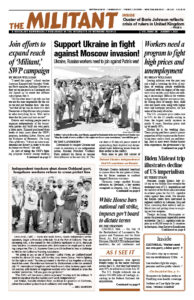President Joseph Biden’s July 13-16 trip to the Middle East revealed the weakened state of U.S. imperialism and the inability of the Biden administration to achieve gains for the U.S. capitalist rulers against their rivals. For decades the Iranian rulers have intervened in regional conflicts in Lebanon, Iraq and Syria, extending their military and political clout and getting closer to acquiring nuclear weapons.
Though declining, Washington remains the preeminent imperialist power worldwide. The U.S. capitalist rulers deploy up to 60,000 troops in 21 countries in the region, from Egypt to Kazakhstan in Central Asia, along with massive sea and air power.
Other rival capitalist powers have intervened in the region, including the rulers of Russia and Turkey, to advance their own national interests.
Moscow’s air superiority and Iran-backed militia forces played a decisive role propping up the Bashar al-Assad dictatorship in Syria, extending their influence in the Mideast. Both the Iranian and Turkish governments aim to use Washington’s and Moscow’s preoccupation with the war in Ukraine to bolster their own interests.
In Israel, Biden signed a July 14 declaration with Prime Minister Yair Lapid reaffirming the U.S. rulers’ longstanding pledge “never to allow Iran to acquire a nuclear weapon.” After the meeting, the U.S. president said he’s still hopeful he can revive the defunct 2015 nuclear accord with Tehran.
But talks with the Iranian government are stalled, despite 18 months of overtures from the Biden administration. In April Tehran announced it was now enriching uranium to 60% purity, bringing it much closer to what it needs for a nuclear weapon. None of the other powers in the Mideast believe this step will be reversed, deal or no-deal, and have to prepare for the likelihood that the Iranian rulers will acquire nuclear weapons. The Saudi government said in 2018 that if that happens, it will do the same.
Iran’s 1979 revolution
In 1979 a powerful revolution in Iran overthrew the U.S.-backed shah, leading to the formation of workers councils in factories, oil refineries and other workplaces across the country, as well as significant mobilizations by oppressed nationalities and women. The Iranian rulers, led by reactionary clerical forces, slowly succeeded in carrying through a counterrevolution that pushed back these advances, but were incapable of erasing them. They have since striven to extend their reach throughout the region. They routinely threaten Israel’s right to exist, arming groups like Hezbollah in Lebanon and Hamas in Gaza.
Tehran’s expansionist foreign policy is paid for by working people in Iran. In recent years there have been regular outbreaks of protests by workers and farmers against the regime and its policies at home and abroad.
The Israeli government has stepped up covert attacks inside Iran. Tehran blames Israeli spies for killing two Revolutionary Guard colonels and other military personnel, two scientists involved in military programs, as well as conducting cyberattacks that halted work at industrial plants connected to the Guards over the last two months.
Since 2017 Israeli Defense Forces have also carried out some 400 airstrikes against Tehran-backed militias operating in Syria and elsewhere in the region.
Some collaboration between Arab regimes and Israel was in evidence during Biden’s visit. The Saudi government, which has yet to recognize Israel, ended all restrictions on flights from Israel July 15. Encouraged by Washington, the Israeli government approved Egypt’s transfer of two Red Sea islands to Saudi sovereignty.
U.S. officials are pushing a regional air-defense alliance between Israel and Arab countries that would allow for coordination in response to any incursion by Tehran.
But during the visit the government of the United Arab Emirates announced it planned to return its ambassador to Iran and resolve any difference with Tehran diplomatically. The UAE is one of the signers of the Abraham Accords, initiated by the previous Donald Trump administration, and has recognized Israel.
Biden held a short meeting with Palestinian leader Mahmoud Abbas in the occupied West Bank July 15, offering financial aid but no proposals for talks between Palestinian leaders and Israel.
The next day Biden met with Saudi leaders, including Crown Prince Mohammed bin Salman, putting the lie to his pledge to treat bin Salman as a “pariah” for his alleged role in masterminding the killing of Saudi journalist Jamal Khashoggi in Turkey in 2018.
The Saudi rulers made clear they will maintain their warming relations with Moscow, regardless of what Washington wants. Saudi Foreign Minister Faisal bin Farhan Al-Saud said any decision to increase Saudi oil production will be taken together with Moscow. He denied Biden’s claim that his trip has enhanced Saudi/Israel relations.
All in all, the trip yielded few rewards for the U.S. imperialist rulers and did nothing to advance Biden’s popularity at home.

